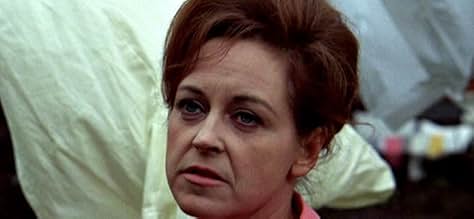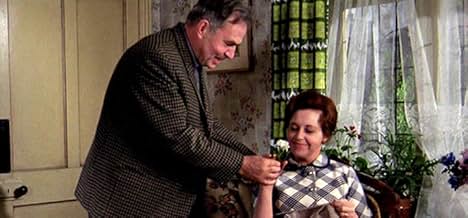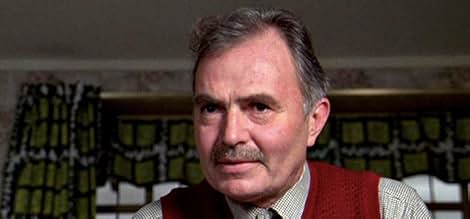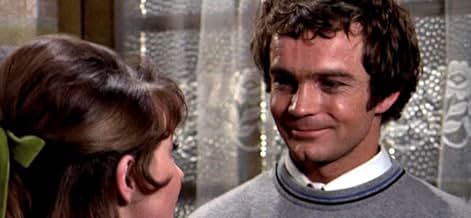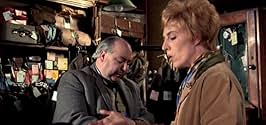CALIFICACIÓN DE IMDb
7.0/10
1.1 k
TU CALIFICACIÓN
Agrega una trama en tu idiomaA stern father and lenient mother try to deal with the ups and downs of their four children's lives in working-class Bolton.A stern father and lenient mother try to deal with the ups and downs of their four children's lives in working-class Bolton.A stern father and lenient mother try to deal with the ups and downs of their four children's lives in working-class Bolton.
Reginald Green
- Bowler 1
- (as Reg Green)
Opiniones destacadas
No matter what mood I'm in, this film always sorts me out. I can't count the times I've watched it, at any time of the day or night. It is the most basic of love stories, showing that the ties that bind a family are often stretched to the limit, but cannot be broken. I have over 500 films in my collection and I don't think there's a more romantic moment in any, than when James Mason takes of his jacket and puts is round Diana Coupland's shoulders. I remember feeling the tenderness of that moment when I first saw the film in the cinema as a young teenager and now I am 50 and it still makes me shiver. There's never been another film which comes anywhere near it. My old video is just about played out and I've copied it on to DVD, but I would love to know if anyone has ever seen it for sale on DVD.
Even though I have lived abroad for more than 50 years, this film so perfectly captures the essence of life in northern England in the 50-60's that I cannot decide whether I want to go back there or stay away. Father knows best - no question. You do as you're told! You "tip up" on Fridays. Mother cooking fish on Friday pay day. Oh my gosh, it is all there. There are so many unforgettable scenes of northern working class life it is like a time warp for those of us who lived it.
For anyone in the future who may wonder what life was like back then when there was virtually full employment in the cotton mills, they could do worse than watch this film.
I wish this film were on TV regularly so that I could show my friends what it was like.
For anyone in the future who may wonder what life was like back then when there was virtually full employment in the cotton mills, they could do worse than watch this film.
I wish this film were on TV regularly so that I could show my friends what it was like.
I have watched this film many times, and it always seems to get better. With great acting performance by James Mason, and the cast of this classic English film. If you have not seen it before, then I highly recommend that you do.
This is an excellent film about a traditional working class family in Northern England. Filmed on location in Bolton, it stars James Mason as the father who is the dominant force within his home. Or so it seems. Cleverly, the film, based on the play, portrays the complexities of family life. The supporting cast is terrific as well, with many familiar faces lending support.
The golden age of the British "kitchen sink" film was the late fifties and early sixties, the age of "Look Back in Anger", "Woman in a Dressing Gown", "A Taste of Honey", "Saturday Night and Sunday Morning", "A Kind of Loving" and others. There were, however, a few excellent examples from the late sixties, such as "Alfie", "Kes" and "Spring and Port Wine". (I know that IMDb gives the date of this last as 1970, but in the closing credits of the film itself it is given as MCMLXIX, or 1969). . These latter three films were all in colour, whereas all the earlier examples cited were in black-and-white. Like "Alfie", "Spring and Port Wine" was based on a stage play by Bill Naughton.
The film is set in Bolton and concerns the working-class Crompton family, especially the patriarch, Rafe. Rafe, a factory worker, is a very conservative figure, not in the sense that he is politically right- wing- if anything, he inclines to the Left- but in the sense that he is traditional in his social attitudes. He is deeply religious and patriotic (he cannot understand people who go abroad for their holidays), and a lover of serious literature and classical music. Above all he takes a very old-fashioned view of family life; the father is head of the household and is owed unquestioning obedience from his wife and from his children, at least as long as they are living under his roof. Something of his attitudes can be gauged from the fact that he has named his four children Harold, Wilfred, Florence and Hilda, all names which would have been regarded as absurdly old-fashioned by most parents of Rafe's generation. (Some of those names, particularly Florence, have made something of a comeback since the sixties).
It must be said, however, that Rafe's attitudes are not always consistent- he claims to hate waste and extravagance, and makes his wife Daisy keep detailed housekeeping accounts, yet will happily spend forty guineas (two week's wages for the average working man at this period) on an expensive bespoke overcoat. (This coat will subsequently play an important role in the plot). Although he dislikes all manifestations of youth culture, especially pop music, and bemoans what he sees as the decline in morality in modern times, he seems unconcerned by the fact that his teenage daughter Hilda habitually wears a provocatively short mini-skirt.
The main theme of the film, a common one in the sixties, is the clash of values between old and young. An explanation of the rather enigmatic title is given in the original play, but this is omitted from the film; cinema audiences probably assumed that "Spring" referred to the rising young generation as contrasted with the "Autumn" of the old. (Hence the title of my review, borrowed from Gabriel Garcia Marquez). A crisis is provoked in the life of the Crompton family when Hilda, with the tacit support of her siblings, defies her father's authority by refusing to eat a herring for supper. Yet the Cromptons are not really a dysfunctional family. Although on the surface they do not demonstrate a good deal of love for one another, there are, beneath that surface, sufficient reserves of mutual respect and affection to help them cope with their difficulties. When a real crisis erupts in Hilda's life, she will find that her father is there for her.
The film's two internationally known stars are James Mason and Susan George, and both are excellent here. George's career was later to suffer from her being typecast as wild young sexpots, which made it difficult for her to get decent parts as she got older; she made few major films after 1980. It has, however, to be admitted that she could be very good in her limited range, and here as the rebellious young Hilda, a nonconformist in a deeply conformist household, she gives one of her best performances. (She was only nineteen at the time). Mason had the previous year in "Mayerling" played another autocratic father, albeit one from a very different social background, the Austrian Emperor Franz Josef. That had been one of his weaker films, but he is much better here as Rafe, the traditionalist trying hard to come to terms with the fact that the traditions he holds dear are no longer universally accepted. Other contributions of note come from Diana Coupland as Daisy, Hannah Gordon as Hilda's milder, more conciliatory older sister Florence, and Avril Elgar as Betsy-Jane Duckworth, the Cromptons' sluttish, slatternly neighbour.
The film was directed by Peter Hammond, better known as a television actor. It appears to be the only feature film he ever made as director, but it is an excellent one. Like many British films it has a strong sense of place, something deriving from extensive use of real Bolton scenes. As in many industrial Northern towns, the late sixties and early seventies were a period of extensive change in Bolton, a period when many historic buildings were being demolished to make way for modernistic, often ill thought-out, urban redevelopment schemes, and much of this transformation is clearly visible in the film. (Something similar can be seen in another British film from around the same time, "Get Carter" set in Newcastle). It seemed to me that Hammond was using these scenes as a visual metaphor for a similar transformation taking place at the heart of the Crompton family as the old inexorably gives way to the new. 8/10
The film is set in Bolton and concerns the working-class Crompton family, especially the patriarch, Rafe. Rafe, a factory worker, is a very conservative figure, not in the sense that he is politically right- wing- if anything, he inclines to the Left- but in the sense that he is traditional in his social attitudes. He is deeply religious and patriotic (he cannot understand people who go abroad for their holidays), and a lover of serious literature and classical music. Above all he takes a very old-fashioned view of family life; the father is head of the household and is owed unquestioning obedience from his wife and from his children, at least as long as they are living under his roof. Something of his attitudes can be gauged from the fact that he has named his four children Harold, Wilfred, Florence and Hilda, all names which would have been regarded as absurdly old-fashioned by most parents of Rafe's generation. (Some of those names, particularly Florence, have made something of a comeback since the sixties).
It must be said, however, that Rafe's attitudes are not always consistent- he claims to hate waste and extravagance, and makes his wife Daisy keep detailed housekeeping accounts, yet will happily spend forty guineas (two week's wages for the average working man at this period) on an expensive bespoke overcoat. (This coat will subsequently play an important role in the plot). Although he dislikes all manifestations of youth culture, especially pop music, and bemoans what he sees as the decline in morality in modern times, he seems unconcerned by the fact that his teenage daughter Hilda habitually wears a provocatively short mini-skirt.
The main theme of the film, a common one in the sixties, is the clash of values between old and young. An explanation of the rather enigmatic title is given in the original play, but this is omitted from the film; cinema audiences probably assumed that "Spring" referred to the rising young generation as contrasted with the "Autumn" of the old. (Hence the title of my review, borrowed from Gabriel Garcia Marquez). A crisis is provoked in the life of the Crompton family when Hilda, with the tacit support of her siblings, defies her father's authority by refusing to eat a herring for supper. Yet the Cromptons are not really a dysfunctional family. Although on the surface they do not demonstrate a good deal of love for one another, there are, beneath that surface, sufficient reserves of mutual respect and affection to help them cope with their difficulties. When a real crisis erupts in Hilda's life, she will find that her father is there for her.
The film's two internationally known stars are James Mason and Susan George, and both are excellent here. George's career was later to suffer from her being typecast as wild young sexpots, which made it difficult for her to get decent parts as she got older; she made few major films after 1980. It has, however, to be admitted that she could be very good in her limited range, and here as the rebellious young Hilda, a nonconformist in a deeply conformist household, she gives one of her best performances. (She was only nineteen at the time). Mason had the previous year in "Mayerling" played another autocratic father, albeit one from a very different social background, the Austrian Emperor Franz Josef. That had been one of his weaker films, but he is much better here as Rafe, the traditionalist trying hard to come to terms with the fact that the traditions he holds dear are no longer universally accepted. Other contributions of note come from Diana Coupland as Daisy, Hannah Gordon as Hilda's milder, more conciliatory older sister Florence, and Avril Elgar as Betsy-Jane Duckworth, the Cromptons' sluttish, slatternly neighbour.
The film was directed by Peter Hammond, better known as a television actor. It appears to be the only feature film he ever made as director, but it is an excellent one. Like many British films it has a strong sense of place, something deriving from extensive use of real Bolton scenes. As in many industrial Northern towns, the late sixties and early seventies were a period of extensive change in Bolton, a period when many historic buildings were being demolished to make way for modernistic, often ill thought-out, urban redevelopment schemes, and much of this transformation is clearly visible in the film. (Something similar can be seen in another British film from around the same time, "Get Carter" set in Newcastle). It seemed to me that Hammond was using these scenes as a visual metaphor for a similar transformation taking place at the heart of the Crompton family as the old inexorably gives way to the new. 8/10
¿Sabías que…?
- TriviaWhen Arthur accidentally drives into the back of a car at the traffic lights (while kissing Florence), the driver of the car in front is the film's producer, Michael Medwin.
- ErroresThe first scenes are on a Friday evening after work. However, later when Rafe goes to play bowls, it is a bright, sunny day with the shadows suggesting it was shot around mid-day.
- Citas
Rafe Crompton: There's no father alive who doesn't long to escape his captivity every now and then...
- ConexionesEdited into Northern Soul (2014)
Selecciones populares
Inicia sesión para calificar y agrega a la lista de videos para obtener recomendaciones personalizadas
- How long is Spring and Port Wine?Con tecnología de Alexa
Detalles
- Fecha de lanzamiento
- País de origen
- Idioma
- También se conoce como
- Hering und Portwein
- Locaciones de filmación
- Sunnyside Mill, Bolton, Greater Manchester, Inglaterra, Reino Unido(was on Adelaide St., now demolished)
- Productora
- Ver más créditos de la compañía en IMDbPro
Taquilla
- Presupuesto
- GBP 198,000 (estimado)
- Tiempo de ejecución1 hora 41 minutos
- Mezcla de sonido
Contribuir a esta página
Sugiere una edición o agrega el contenido que falta

Principales brechas de datos
By what name was Spring and Port Wine (1970) officially released in Canada in English?
Responda

